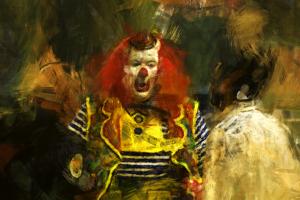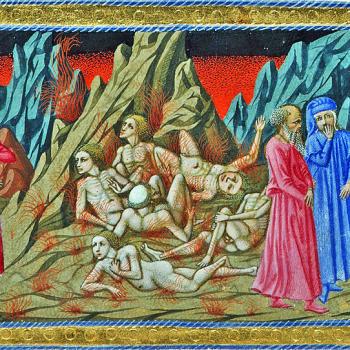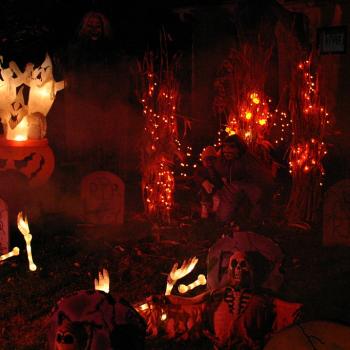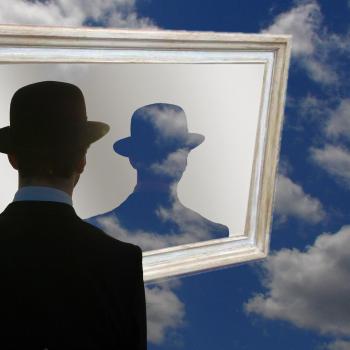
Many people find clowns to be extraordinarily creepy. There is something about the way they look that makes people afraid. It is not that clowns are evil (though of course, there have been evil clowns), it is the fact that the way they imitate and distort the human image makes them look evil. And why does it make them look evil? Because evil imitates and distorts the good, often becoming a parody of the good itself. Those who fear clowns seem to intuitively connect the way their makeup distorts the human figure with the way evil distorts the good. The parody suggested by clowns is the kind of parody found with evil, though of course, the difference is that clowns do not present themselves to be anything but parodies, while evil presents its parody as being the truth.
Evil rarely presents itself as evil. It rather wants us to believe it represents some good. How does it get us to believe this? By taking some element of the good, exaggerating it and promoting it at the expense of the holistic good, so that the good itself becomes distorted. What is missing from the holistic good is what leads such evil to produce actual harm. For what is lacking in the good is a necessary element of the good, and without it, the void which is made will be felt, in some fashion or another. But the evil tries to distract us from this. It wants us to believe what it is, is the good, and nothing but the good, so it shows itself, in its sickly imitation of the good, as the good itself. Those who have a better awareness of the good, or at least the good which has been distorted, or the good which has been lost due to that distortion, will be able to see the evil for the comic monstrosity it is. Evil does not want to be seen as cartoonish, but those not swayed by it can see how buffoonish it really is. This is why one of the best ways to overcome evil is to take its power away by mocking it. For then, it will not be taken seriously, and it needs us to take it seriously for us to believe its lies.
“Take no part in the unfruitful works of darkness, but instead expose them” (Eph. 5:11 RSV). We must show the world how cartoonish evil really is. It would be funny if it were not taken so seriously. All villainy is comic in nature, though of course, evil is sad and pitiful underneath its blusterous exterior. Thus, we should not fear those who can destroy the body (cf. Matt. 10:28), because such fear only reinforces the illusion which evil gives of itself; we must be willing to laugh at it – in its face, if need be, so as to show it and the world we know how weak and powerless it is.
Making fun of evil does not mean that we can ignore it and its effects in the world. It is terrible, and it can indeed cause great harm. We must fight it. We must expose its character, but we also must resist its attempt to spread its cancerous corruption into the world, to create comic monstrosities in its wake. For, despite their clownish character, those aligning themselves with evil are monstrosities, and they can and will do much harm if they are not stopped. Ridiculing them helps prevent people fall into their sway. Ridiculing them takes away much of their power, but not all of it. For the good which they use, or abuse, remains with them, and that good gives them the potential to lead people astray. They con people into following them and doing their bidding because of that limited good. They will have people defend them, often violently, as a way to defend that particular good. And because it is a good, people who follow such monstrosities think they are doing good, and so do not see how they are helping evil corrupt and destroy the world around them.
Evil, therefore, is established in the good which it distorts and manipulates; it pretends to be good, but when it is exposed, it is shown to have only been a parody of that good itself, as S.L. Frank recognized:
Among the multiple manifestations of evil are discernable three symptomatic aspects – parasitism, imposture and parody. The Evil One lives as a parasite on the being created by God, forming a monstrous excrescence, a demonic swelling. As an impostor, he covets the divine attributes, and substitutes equality for likeness. [1]
The more some evil attaches itself to the good, the more it corrupts that good, and becomes a parody of that good, but it is a parody which presents itself, not as a parody, but as that good itself. Thus, if we hear of someone claiming themselves to be pro-life, but defend the death penalty, unjust wars, torture, and other oppressive structures of sin which denigrate the value of human life, they are not pro-life. They represent only a monstrous imitation of it. They need to be exposed and ridiculed in order to be defeated. Likewise, someone who claims to support religious liberty and yet only defends religious liberty to a few, and not to all, shows themselves to represent a parody of religious liberty, a parody which, history shows, leads to undue amounts of violence and cruelty to those not among the favored few. The imitation of the good is there, but it is a vile imitation, a monstrosity which distorts the good and so leads to great evil in the name of the good.
The main effect of darkness is that it separates, isolates, makes lonely, incarcerates, shackles, that it ruptures every communication from one man to another, and this it does effortlessly with a single chain to which all those isolated are bound. [2]
Evil corrupts the good, dissecting it like a cruel vivisectionist. God created the world and saw it good. Evil, with a nihilistic hatred for existence, deconstructs the world, cutting it apart. We must fight the corruption of evil, and the isolation which it makes. The structures of sin separate and divide, causing many to suffer oppression based upon the way those divisions are made. We must break through that divide. We must heal the rifts which evil has created. We must once again establish the fullness of the good, overcoming the monstrous, clownish evil which lies before us. But to do so, we must first recognize the foolishness of evil so as not to be drawn in by its clownish antics.
[1] Paul Evdokimov, Ages of the Spiritual Life. Trans. Sister Gertrude, SP. Revised Michael Plekon and Alexis Vinogradov (Crestwood, NY: St. Vladimir’s Seminary Press, 2002), 89.
[2] Hans Urs von Balthasar, The Christian and Anxiety. Trans. Dennis D. Martin and Michael J. Miller (San Francisco: Ignatius Press, 2000), 47.
Stay in touch! Like A Little Bit of Nothing on Facebook.
If you liked what you read, please consider sharing it with your friends and family!













